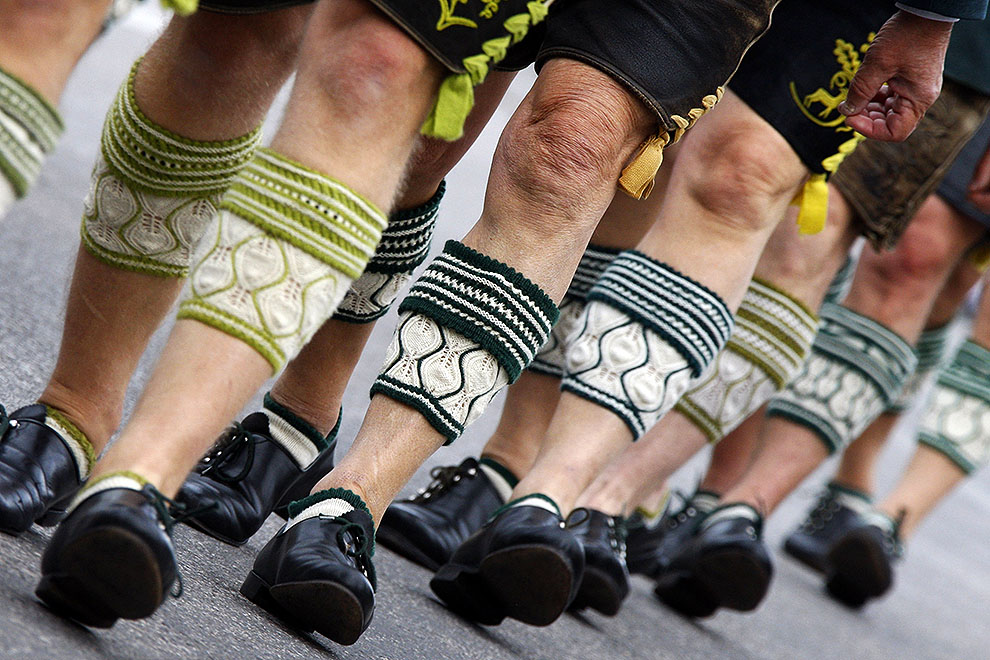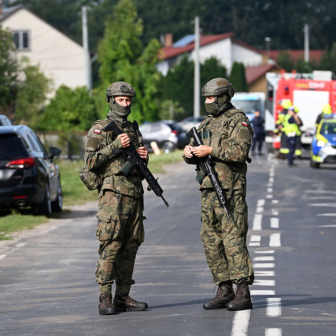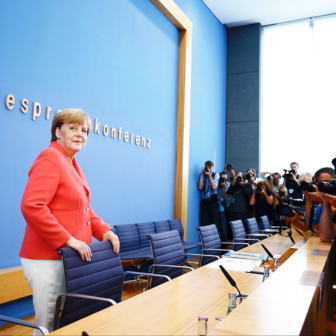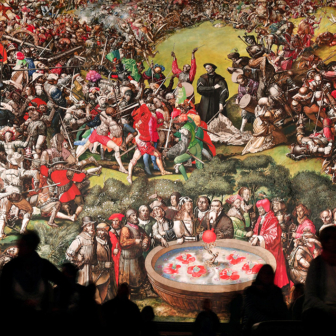Anniversaries are opportunities for reflection and re-evaluation. In recent weeks, news media around the world have commemorated and reassessed the events of late August and early September 2015 that led to the arrival of hundreds of thousands of refugees and asylum seekers, and their initially enthusiastic reception, in Germany.
In Germany itself, the anniversary dominated newspapers and magazines and featured prominently on talk shows and current affairs programs on television and radio – to the extent that Germany’s invasion of Poland on 1 September 1939, an event whose anniversary usually prompts intense public reflection, was barely mentioned. But which was the pivotal event that deserved to be singled out? Which date in particular marked Germany’s extraordinary response to the refugee crisis?
Was it 27 August, when the bodies of seventy-one migrants were found in a refrigerated truck in Austria? Was it 2 September, when Nilüfer Demir’s images of three-year-old Alan Kurdi, whose body had been washed up on a Turkish beach, began circulating online? Or was it rather 4 September, when Angela Merkel and her Austrian counterpart Werner Faymann agreed to ignore the Dublin Regulation and issue an invitation to refugees who were receiving a hostile reception in Hungary?
While all these events received much attention, most German commentators focused on 31 August 2015. On that day, Angela Merkel gave her traditional Sommerpressekonferenz, an extended mid-year press conference. Before inviting journalists’ questions, she spoke about the influx of refugees into Europe. By then, the ministry of the interior expected a total of 800,000 irregular migrants to arrive that year in Germany alone.
Merkel said that Germans’ response needed to be guided by the principles laid down in the Basic Law, the Federal Republic’s 1949 constitution. She referred to Article 16a, the right to asylum. She also talked about Article 1(1) – “Human dignity shall be inviolable. To respect and protect it shall be the duty of all state authority” – and emphasised that it did not distinguish between citizens and non-citizens.
At length, she discussed the measures already taken or planned by her government. “Germany is a strong country,” she said in conclusion. “The motif with which we approach these things has to be: [In the past,] we were able to do so much – we are able to do this. We are able to do this, and wherever there are obstacles, we have to overcome them, we have to deal with them.”
More than anything else, the three words wir schaffen das (we are able to do this) are likely to define Merkel’s reign as chancellor. Even back in August 2015, it was clear that they were more than a rhetorical flourish (which is not something Merkel is known for anyway) and had been planted deliberately. Since then, she has reiterated these three words many times, albeit sometimes with qualifiers (such as “but we won’t be able to do this all by ourselves”). Despite being harshly criticised for her statement by members of her governing coalition, and despite the fact that a clear majority of Germans now opposes her refugee and asylum seeker policies, she has stuck to these three words.
In recent weeks, public commentators seeking to identify the event that could stand in for the extraordinary developments of August and September 2015 have focused on Merkel’s optimism at the time, and on her stubborn refusal to abandon it – even after the number of arrivals was larger than anticipated, after the sexual assaults perpetrated by migrant men on New Year’s Eve 2015 in Cologne and elsewhere, and after the terrorist attacks in July. Of course, wir schaffen das also lent itself to analyses exploring whether Germany has indeed been “able to do this,” and whether there is any foundation for the chancellor’s continued optimism.
In other respects, though, the focus on the anniversary of Merkel’s wir schaffen das was a curious choice, because the Sommerpressekonferenz preceded the decision she and Austrian chancellor Werner Faymann made to accommodate thousands of refugees stranded in Hungary. In a way, the commentators didn’t so much commemorate the occasion on which she first uttered the three words, but rather her subsequent refusal to back down and adopt a less optimistic tone after the decision to keep Germany’s borders open.
What prompted Merkel to launch her wir schaffen das on 31 August last year? And how did her decision to be demonstratively optimistic relate to the decision four days later not to bar large numbers of refugees from entering Germany?
Merkel introduced her discussion of refugee issues at the press conference by talking about the dead migrants discovered in Austria four days earlier. “These are images that exceed our imagination,” she said. “All this happens while we here live in very secure circumstances.” The tragedy on an Austrian Autobahn allowed Merkel to contrast the precariousness of the lives of people fleeing war or persecution with the comfort enjoyed by Germans, but it didn’t prompt Merkel’s decision to talk to the nation, via the Sommerpressekonferenz, about refugees.
Merkel was spurred to take the initiative by events a week earlier in the small town of Heidenau, just south of Saxony’s capital, Dresden. On the weekend of 23–24 August, racist riots in front of a former hardware store, which had been repurposed to accommodate asylum seekers, reminded Germans of a past most thought was well behind them: the past of the anti–asylum seeker hysteria of the early 1990s and the pogrom-like protests in Rostock-Lichtenhagen on 22–25 August 1992.
Merkel travelled to Heidenau on 26 August. This was the first time in her ten years as a chancellor that she had visited a hostel for asylum seekers. She was stunned when locals greeted her with chants of “Volksverräter,” a term that was used in Nazi Germany to designate people accused of treason against their own nation.
Merkel’s wir schaffen das was also a statement of defiance in light of the aggression and anger she experienced in Heidenau. “We need to clearly distance ourselves. There can be no apologies,” Merkel said at the press conference five days after her visit, referring to the protesters. “The key is not to show even the slightest bit of understanding. No biographical experience, nothing that happened in the past, nothing, absolutely nothing justifies [their] stance.”
When, less than a week after her wir schaffen das, she agreed to let refugees stuck in transit in Hungary enter Germany, she did so partly to send a message to those who had rioted in Heidenau. Not only was she not going to make concessions to appease xenophobes; she upped the ante, as it were. In doing so, she seemed, for a while at least, to have the backing of a broad majority of Germans, and the almost unanimous support of the print and electronic media.
Since August last year, there have been other Heidenaus. An alarmingly large proportion of Germans sympathise with those who try to torch buildings where asylum seekers are accommodated. In two state elections in the former East Germany, in Sachsen-Anhalt on 13 March and in Mecklenburg-Vorpommern earlier this month, the Alternative for Germany, or AfD, a party whose leaders openly advocate xenophobic and Islamophobic positions, have won well over 20 per cent of the vote, in both instances becoming the second-largest party in state parliament.
In Sachsen-Anhalt, the AfD polled far more votes than the Social Democrats, the Free Democrats and the Greens combined; in Mecklenburg-Vorpommern, the state in Germany’s northeast that includes Merkel’s own electorate, it won more votes than the Christian Democrats. (In the state electorates that comprise Merkel’s own federal electorate, the Christian Democrats prevailed narrowly.)
For almost a year, Horst Seehofer, the leader of the Christian Democrats’ Bavarian sister party, the Christian Social Union, or CSU, has relentlessly attacked Merkel over her refugee policies. This may partly be because he was outraged about not having been consulted on 4 September, when Merkel and Faymann agreed to ignore the Dublin agreements. But his stance is also informed by a doctrine, once formulated by the legendary Franz Josef Strauss, that there must not be a democratically legitimated party to the right of the CSU.
More recently, Sigmar Gabriel, the leader of the Social Democrats and Merkel’s deputy in the federal coalition government, has also hit out at Merkel, both accusing her of mismanaging Germany’s response to refugees and echoing Seehofer’s demands that the government agree on an upper limit of irregular migrants admitted to Germany per year.
Last month it emerged that Merkel did not in fact invent the line wir schaffen das; rather, it was Sigmar Gabriel who had coined it in a podcast on 22 August last year. It is telling that he has kept quiet about his authorship, preferring instead to criticise Merkel for repeating a phrase “that doesn’t solve a single problem.” He also doesn’t want to be reminded of the fact that, unlike Horst Seehofer, he was briefed beforehand about Merkel and Faymann’s plan not to close the borders to refugees, and did not raise any objections.
Neither Seehofer nor the hate-mongers from the AfD have been swayed by the fact that Merkel has presided over the introduction of several draconian legislative measures. These make it easier for the authorities to deport asylum seekers whose claim for protection has been rejected, and make it possible to provide different levels of support to asylum seekers depending on where they come from. Merkel’s critics have also been unimpressed by the controversial German-engineered deal between Turkey (or rather, its autocratic president Recep Tayyip Erdoğan) and the European Union, which makes it all but impossible for irregular migrants to enter Europe via Greece.
Angela Merkel doesn’t have many political friends these days. In the Bundestag, perhaps the Greens, with whom Merkel would love to be able to form a coalition government, are her staunchest supporters. In earlier years, the Social Democrats were happy to bask in the glow of her popularity. But with an eye on the federal elections in the second half of next year, they are now distancing themselves from a chancellor who appears to be wounded.
Gabriel has obviously been encouraged by the fact that in the elections of 4 September in Mecklenburg-Vorpommern, the Social Democrats did comparatively well, although they too lost votes. Their comparative success has been widely attributed to the opportunism of the premier, Social Democrat Erwin Sellering, who criticised Merkel’s response to refugees, saying during the election campaign that “Merkel still pretends that Germany can accommodate everybody who has been persecuted.”
How justified are Merkel’s detractors? Were Germans “able to do this”? And if so, are they likely to be able to do this in years to come?
Federal, state and local authorities have been struggling to cope with the influx of asylum seekers. If it hadn’t been for the fact that many Germans have volunteered their time in the past twelve months – for example, accommodating new arrivals, teaching them German, helping them to fill in forms, interpreting, organising transport and childcare – many government services would probably have collapsed.
But it should also be acknowledged that the number of new arrivals, particularly between August and November 2015, presented enormous challenges even for a country as affluent and well-organised as Germany, and that, overall, these challenges were met successfully.
The Federal Office for Migration and Refugees – the agency in charge of registering new arrivals and processing their protection claims – has underperformed, to say the least. Hundreds of thousands of asylum seekers are still waiting to lodge their claims, and many more have been waiting for months, if not years, for a decision. But once the agency was able to recruit hundreds of new staff last year, things began looking up: in the first eight months of 2016, it has made decisions on almost 400,000 asylum claims, and in the same period only a little over 250,000 asylum seekers arrived in Germany.
So far, only 40,000 of those who have arrived since 2015 have found a job. The unemployment rate among refugees is above 50 per cent, compared to 6.1 per cent overall. But rather than being an indication that Germany was not “able to do this,” this result demonstrates that last year’s expectations – that refugees would quickly find employment and thereby address labour shortages – were utterly unrealistic.
The federal government has spent billions of euros on paying for accommodation, language courses and training, and the processing of claims. It can afford to do so, because Germany doesn’t have a budget deficit. But the funds have not always arrived at the local government level, where they are most needed.
Sufficient funds have not been a guarantee for efficient management. New arrivals are distributed across Germany according to a formula that takes into account individual states’ population size and economic capacity. The performance of state and local administrations has varied significantly. Bavaria, led by premier Seehofer, has done comparatively well, whereas the state of Berlin has performed particularly poorly.
Resources have not been spread evenly among asylum seekers. Eritreans, Syrians and Iraqis, for example, have access to language classes, while those from countries that have been deemed safe do not. Among asylum seekers and refugees, a class system has emerged. Some asylum seekers have had their claims processed promptly; others haven’t yet been invited to submit claims, although they arrived some time last year. Some have been stuck in gymnasiums and other emergency accommodation; others have been accommodated in apartments.
While the number of irregular migrants who arrived last year posed enormous challenges, there is broad agreement that the authorities are comfortably able to cope with the expected 300,000 new arrivals this year. This is still a sizeable number in a country of about 82 million people.
The government’s capacity to deal with the influx is reflected in somewhat surprising opinion polls. While a majority rejects Merkel’s refugee policies, the proportion of Germans who trust Merkel’s wir schaffen das has risen from 37 per cent last September to 43 per cent in August, according to Emnid polling.
The question of whether Germany will continue to successfully manage the arrival of irregular migrants can’t be readily answered. What if Erdoğan decides that it is not worth Turkey’s while to act as a bouncer at Europe’s southeastern gateway? What if, once again, hundreds of thousands of refugees enter Europe via Greece and then make their way to Germany? What if the economic situation in Germany changes, unemployment rises, and there is pressure on the budget? Most importantly, what if the popular opposition to the presence of irregular migrants in Germany continues to grow?
Many German observers have been astounded by the fact that Angela Merkel has stuck to her guns and maintained wir schaffen das. In the past, she wasn’t known for policies that were ideologically driven, nor was her approach to governing informed by unshakeable convictions. Often, as she sought to align her views with those of the majority of voters, it was difficult to figure out what exactly she stood for. That is clearly no longer the case. Also, unlike some of her predecessors, Merkel is not a gifted speaker, and does not usually rely on rhetoric to communicate her views to the public; it was therefore unusual for her to make so much use of a three-word slogan.
But let’s not be fooled. Angela Merkel has not ruled out seeking another four-year term as chancellor at the 2017 elections. All indications are that she is already preparing herself for battle. She knows that she needs to regain the affection and trust of voters to be able to pull off a fourth election victory. Insisting stubbornly that Germans will be able to deal successfully with the arrival of hundreds of thousands of refugees is not going to allow her to make up lost ground.
With the benefit of hindsight, it appears that the launch of wir schaffen das on 31 August last year was indeed a historic occasion. Exactly one year later, she has come up with a new and very different line: Deutschland wird Deutschland bleiben (Germany will remain Germany).
She tried out these words first in an interview with the liberal Munich daily Süddeutsche Zeitung. Unlike wir schaffen das, the new line came in response to a question and did not seem to have been planned. But lest anybody failed to grasp its significance, on the day of the interview’s publication the website of Merkel’s Christian Democratic Union ran an article with the title “Merkel: Deutschland wird Deutschland bleiben.” A week later, Merkel repeated the line in a much-anticipated speech in the German Bundestag. On both occasions, she said that “Germany will remain Germany, with everything we cherish.”
Both the old and the new slogan use the first person plural. Merkel seems to seek a communion with her people, although the significance of the grammatical form is ambiguous. The “we” in wir schaffen das could refer to the government as well as to all Germans. In the more recent line, Merkel seems to suggest that her patriotism doesn’t differ from that of other Germans. Or is she perhaps using the royal we?
The earlier line was meant to encourage Germans to swing into action. It is oriented towards the future. Now she seems to be intent on calming down her audience, assuring them that the past is replicated in the future. “Let’s make things happen,” on the one hand, and “nothing will happen,” on the other.
In one sense, this new slogan is tautological. But in another, it affords the opportunity to define what Germany is, or ought to be, all about. In the Bundestag last week, Merkel spelled out what the Germany she cherishes looks like. According to the chancellor, it is based on four values: freedom, security, justice and solidarity. In another recent interview, she said, “We are a country for whom the dignity of every single human being is paramount.”
This is, of course, not the same Germany that AfD voters conjure and long for, although her new mantra is dangerously close to the AfD’s rhetoric. The party’s leader in Mecklenburg-Vorpommern, for example, said recently, “We fight for Germany to remain the country of Germans.”
Merkel embraces change but assures voters that everything will stay as it is. Thorsten Denkler, Süddeutsche Zeitung’s Berlin correspondent, called this “Merkelian dialectics.” Taken on its own, Merkel’s new line is unrealistic – much more so than her wir schaffen das. It suggests that all newcomers embrace and adapt to German values and German cultural traits, whatever they may be. It denies the obvious: that Germany has changed almost beyond recognition in the space of one generation, and is likely to continue changing rapidly both as a result of globalisation and because of its substantial migrant intake.
But I suspect that if Merkel feels confident enough to run again next year, and if she is re-elected, it will be because enough voters have realised she was right on 31 August 2015, and ignore her new mantra. And if my hunch is correct, then an extension of her term as chancellor (possibly courtesy of Greens support) would only prove that Germany has not remained what it was, and that it continues to evolve as a dynamic society of immigration.
At this point, it is difficult to predict what will happen next year. It may well be that the AfD’s support continues to surge. On the weekend, though, in local elections in Lower Saxony (a West German state), the AfD mostly remained below 10 per cent, which might suggest that the party’s meteoric rise is a predominantly East German phenomenon. Next Sunday, the voters of Berlin will elect a new state parliament – and the result of these elections will provide further clues.
It may well be that Horst Seehofer’s recent Deutschland muss Deutschland bleiben (Germany must remain Germany), rather than Merkel’s Deutschland wird Deutschland bleiben, will gain traction. While Merkel told the Bundestag that Germany has changed and will continue to change – “there is nothing wrong with change,” she said – Seehofer and his Christian Social Union don’t want Germany to change “as a result of migration and refugee flows,” as the party’s recent position paper put it. Merkel tries to reassure Germans; Seehofer tries to make the most of their fears.
Will the established parties be able to absorb AfD voters? And if so, what would be the price? Last week, the former leader of the left-wing Die Linke, Gregor Gysi, put forward an idea that makes some sense. “The [Christian Democrats] have a job to do, which can’t be done by anybody else. They could integrate parts of the AfD,” he said. In his analysis, the AfD has become possible because Merkel made the Christian Democrats adopt Social Democratic policies, just as her predecessor as chancellor, Social Democrat Gerhard Schröder, had distanced himself from his party’s Social Democratic heritage. As a result, the Social Democrats and the Christian Democrats have become almost indistinguishable parties of the centre; the AfD then filled the vacuum that opened up on the right of the political spectrum. In Gysi’s view, the problem could be rectified once the Christian Democrats are in opposition (which would require Die Linke and the Greens to join a Social Democrat–led government).
If the Christian Democrats were to lose next year’s election, support for the AfD might indeed decline. That’s not so much because Merkel’s party would move to the right, but because the AfD’s focus would be gone. The party is beset by internal rivalries and power struggles. With one exception, its message is diffuse. That exception is the demand, inevitably chanted at rallies by supporters of AfD and and the anti-immigration movement PEGIDA: “Merkel muss weg!” (Merkel has to go).
Yes, the right-wing populists are opposed to Muslims, refugees, inner-city lefties, feminists, intellectuals, footballers of African background and others who in their view don’t have a place in the country of the Germans. But they reserve their hatred for Merkel, the East German woman who betrayed them. As Tilman Gerwien wrote in the magazine Stern last week, “the AfD is the anti-Merkel party.” It is their shared hatred of Merkel that holds the AfD’s warring factions and its disparate group of followers together. If she were to go, the party’s main target would disappear.
What Gysi didn’t say is that many of the AfD’s voters in the East German states previously voted for Die Linke. The AfD’s success became possible also because Die Linke, once identified as a left-wing party of protest, has become yet another establishment party. Since 2014, one of its politicians has even been premier (of the East German state of Thuringia). Nor did Gysi mention that the deputy leader of his party, Sahra Wagenknecht, has lately been advocating refugee and asylum seeker policies that are suspiciously close to those of the AfD.
There is another reason to be wary of Gysi’s analysis. The circumstances of the rise and demise of another right-wing populist party, the Republikaner, in the early 1990s suggests that the Christian Democrats might only strengthen the AfD if they took on some of its agenda and thereby tried to absorb its voters. The Strauss doctrine may have worked in Bavaria, but in neighbouring Baden-Württemberg attempts by the Christian Democrats to starve the Republikaner of votes by adopting right-wing populist positions backfired badly.
Views on whether Germany has changed, or will change, for the better may differ. But it is hard to argue with the claim that over the past twelve months German domestic politics have been more fascinating, and have had more significant implications for the rest of Europe, than at any other time in the past twenty years. And it’s hard to see how that will change anytime soon. •




